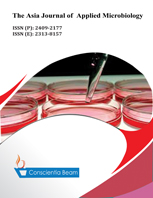Mycoflora and Aflatoxin Contamination of Kokoro-A Nigerian Maiza Snack
Abstract
Kokoro is maize snack which is very popular among poor masses in Nigeria who consume it along with gari(a cassava product) as lunch on regular basis. In this study fungal contaminants of kokoro were characterized and its aflatoxin content determined. A total of 30 fungal isolates were obtained from kokoro samples and they belong to 3 different species. Aspergillus flavus had the highest frequency of occurrence of 73.33% while Penicillium species had the lowest (6.66%). Different concentration of aflatoxin B1 was detected in some of the kokoro samples analyzed. Sample D had the highest concentration of 7.25 parts per billion (ppb). The lowest concentration detected was 0.06 ppb in sample P. No aflatoxin G1 and G2 was detected in all the kokoro samples with exception of sample P which contained 2.54 ppb aflatoxin G1.According to international standards some of the kokoro samples are not suitable for human consumption because of high level aflatoxin which was above the recommended level. Therefore, production of kokoro should be standardized and appropriate packaging materials utilized to prevent the growth of aflatoxigenic fungi. This is to safeguard the health of many poor Nigerians who consume it on a regular basis.

